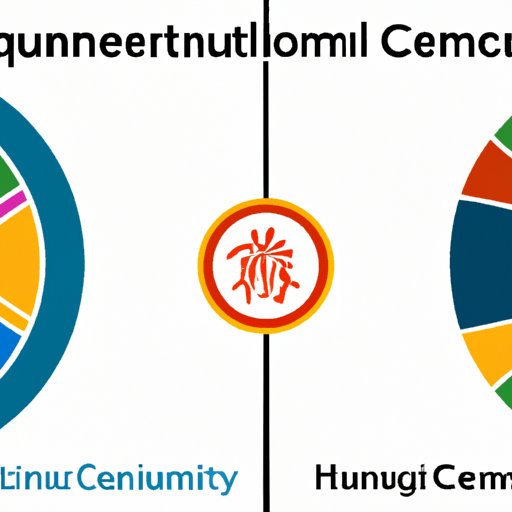Introduction
Cultural competence and cultural humility are two concepts that have been gaining traction in the field of healthcare. Although they are often used interchangeably, they are distinct concepts with different implications for practitioners. This article explores the contrasts between cultural competence and cultural humility, examining their theoretical foundations, benefits and drawbacks, and strategies for developing each.
A Comparison of Cultural Competence and Cultural Humility: Exploring the Differences
Before delving into the various distinctions between cultural competence and cultural humility, it is important to first define each concept.
Defining Cultural Competence
Cultural competence is defined as the ability to effectively interact with individuals from different cultures, taking into account their unique perspectives, values, and beliefs. It involves having knowledge about different cultures, as well as understanding how cultural differences can impact communication, behavior, and interactions. Cultural competence also entails being aware of one’s own biases and stereotypes, and actively working to reduce them.
Defining Cultural Humility
Cultural humility is a concept related to, but distinct from, cultural competence. It is defined as an attitude of respect and openness toward people from different cultures, as well as a commitment to self-reflection and lifelong learning. It involves recognizing one’s own biases and limitations, and engaging with others without making assumptions or judgments. It is based on the idea that no one has all the answers, and that everyone can learn from each other.
Contrasts between Cultural Competence and Cultural Humility
Although both cultural competence and cultural humility involve interacting with people from different cultures in respectful and meaningful ways, there are several key distinctions between the two concepts. Cultural competence focuses primarily on knowledge and skills, while cultural humility emphasizes attitudes and beliefs. Cultural competence involves becoming knowledgeable about different cultures, while cultural humility involves actively listening to and learning from others. Additionally, cultural competence is often seen as a goal to be achieved, while cultural humility is seen as an ongoing process of self-reflection and learning.
Understanding Cultural Competence and Cultural Humility: What Are the Distinctions?
In order to understand the contrasts between cultural competence and cultural humility, it is important to examine the theoretical foundations of each concept.
Theoretical Foundations
Cultural competence is rooted in the belief that all individuals should be treated with respect and dignity, regardless of their culture or background. It is based on the idea that people from different cultures may view the world differently, but this does not mean that any one perspective is more valid than another. Cultural humility, on the other hand, is based on the idea that no one has all the answers, and that everyone can learn from each other. It is an attitude of openness and respect for others, and a willingness to listen and learn from their perspectives.
Benefits and Drawbacks of Each
Both cultural competence and cultural humility have their benefits and drawbacks. The primary benefit of cultural competence is that it can help healthcare practitioners provide better care to patients from different cultures, as they will be better equipped to understand and address their needs. However, relying solely on cultural competence can lead to a “one-size-fits-all” approach, which can be ineffective in addressing the unique needs of each patient. Cultural humility, on the other hand, can help healthcare practitioners foster relationships with their patients, as it encourages them to be open and respectful of their perspectives. However, it can also lead to feelings of discomfort if practitioners are not adequately prepared to engage with patients from different cultures.

Defining Cultural Competence and Cultural Humility: Exploring Their Contrasts
In order to better understand the distinctions between cultural competence and cultural humility, it is important to examine their core values.
Core Values
The core value of cultural competence is respect. It is based on the belief that all individuals should be treated with respect and dignity, regardless of their culture or background. Cultural humility, on the other hand, is based on the idea of mutual respect and understanding. It is an attitude of openness and respect for others, and a willingness to listen and learn from their perspectives.
Respectful Engagement
Cultural competence requires practitioners to become knowledgeable about different cultures, in order to better understand and meet the needs of their patients. It involves being aware of cultural differences and being able to tailor care accordingly. Cultural humility, however, is less concerned with knowledge and more focused on respectful engagement. It is based on the idea that no one has all the answers, and that everyone can learn from each other. It involves engaging with patients from different cultures in an open and respectful manner, without making assumptions or judgments.

The Contrast Between Cultural Competence and Cultural Humility: Examining Their Differences
In order to further explore the differences between cultural competence and cultural humility, it is important to examine their respective knowledge and skills, as well as their attitudes and beliefs.
Knowledge and Skills
Cultural competence requires practitioners to have knowledge and skills related to different cultures, such as language proficiency and cultural awareness. It also requires them to be able to recognize and address potential cultural barriers in their interactions with patients. Cultural humility, on the other hand, does not require specific knowledge or skills, but rather an attitude of openness and respect for others. It is based on the idea that everyone can learn from each other, and that no one has all the answers.
Attitudes and Beliefs
Cultural competence involves having a positive attitude toward different cultures, as well as being aware of one’s own biases and stereotypes. It requires practitioners to be open to learning and adapting to different cultural norms and expectations. Cultural humility, on the other hand, requires practitioners to be humble and open to learning from others. It involves recognizing one’s own biases and limitations, and engaging with others without making assumptions or judgments.

Exploring the Differences Between Cultural Competence and Cultural Humility
In order to develop cultural competence and cultural humility, it is important to understand the various strategies for doing so.
Strategies for Developing Cultural Competence
Developing cultural competence involves gaining knowledge about different cultures, as well as understanding how cultural differences can impact communication, behavior, and interactions. Practitioners can do this by taking courses or attending workshops on cultural competence, reading books and articles about different cultures, and engaging in meaningful conversations with individuals from different backgrounds. Additionally, practitioners can observe how people from different cultures interact, and strive to be aware of their own biases and stereotypes.
Strategies for Developing Cultural Humility
Developing cultural humility requires practitioners to be open to learning from others, and to recognize their own biases and limitations. Practitioners can do this by engaging in meaningful conversations with individuals from different cultures, asking questions and actively listening to their perspectives. They can also seek out feedback from colleagues and mentors who have experience working with diverse populations. Additionally, practitioners can strive to be aware of their own biases and strive to be open and respectful in their interactions with others.
Conclusion
Cultural competence and cultural humility are two distinct concepts that involve interacting with individuals from different cultures in respectful and meaningful ways. Although they are often used interchangeably, there are several key distinctions between the two concepts. Cultural competence focuses primarily on knowledge and skills, while cultural humility emphasizes attitudes and beliefs. Additionally, cultural competence is often seen as a goal to be achieved, while cultural humility is seen as an ongoing process of self-reflection and learning. In order to develop cultural competence and cultural humility, practitioners must engage in meaningful conversations with individuals from different cultures, ask questions, and actively listen to their perspectives. By understanding the contrasts between cultural competence and cultural humility, healthcare practitioners can better serve their patients and foster relationships with them.
(Note: Is this article not meeting your expectations? Do you have knowledge or insights to share? Unlock new opportunities and expand your reach by joining our authors team. Click Registration to join us and share your expertise with our readers.)
